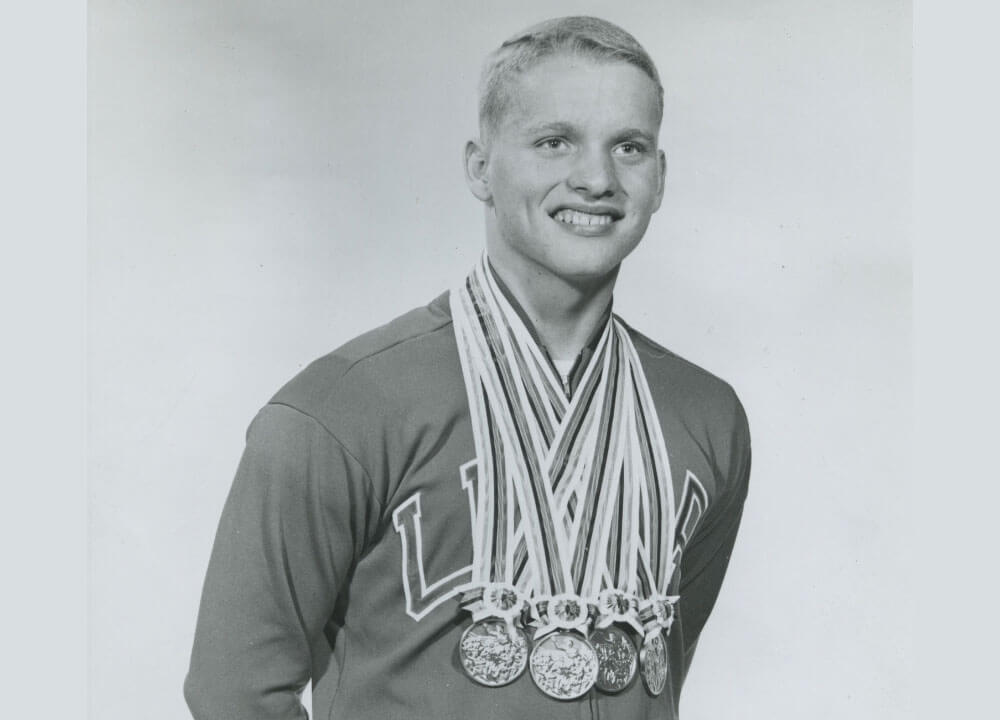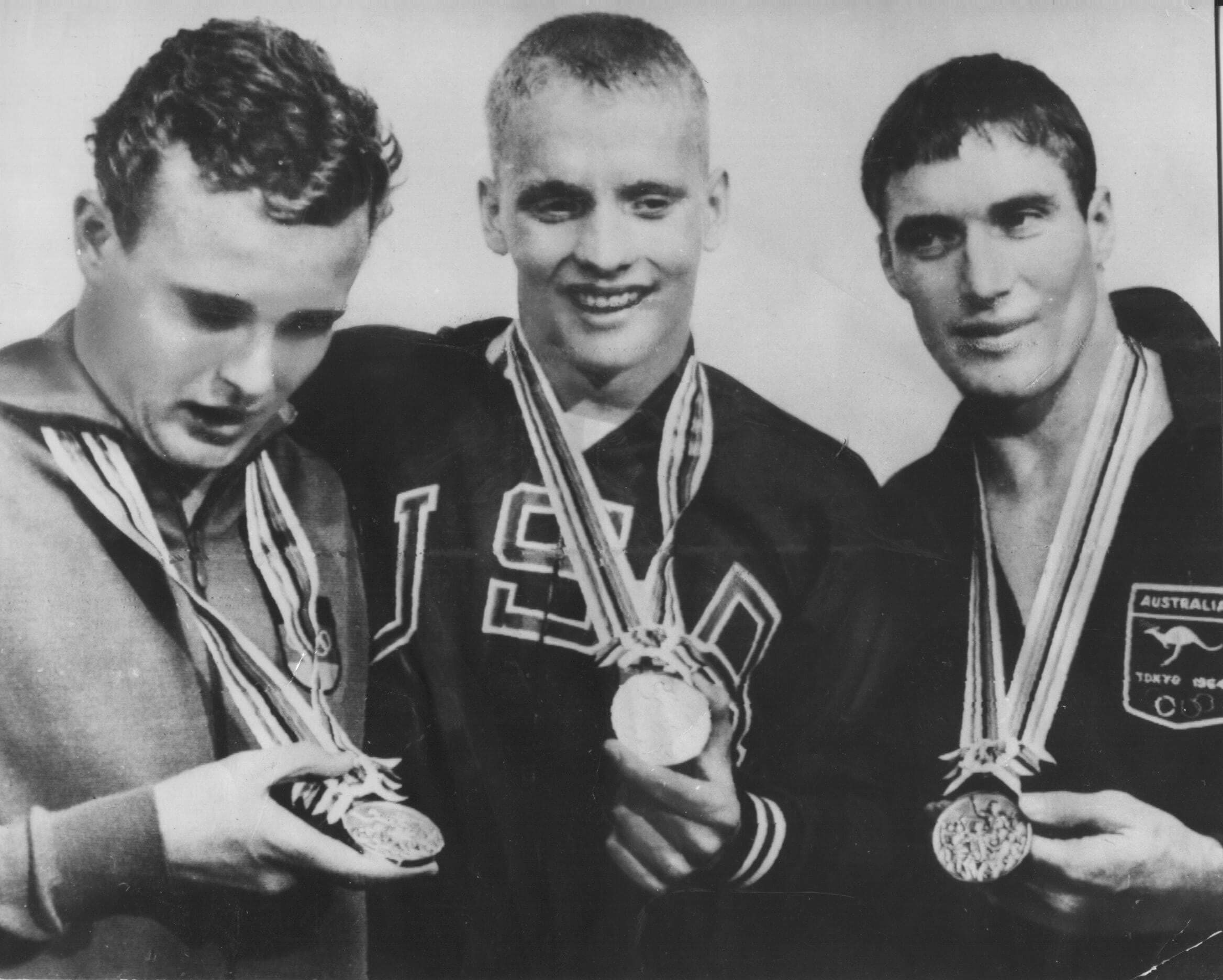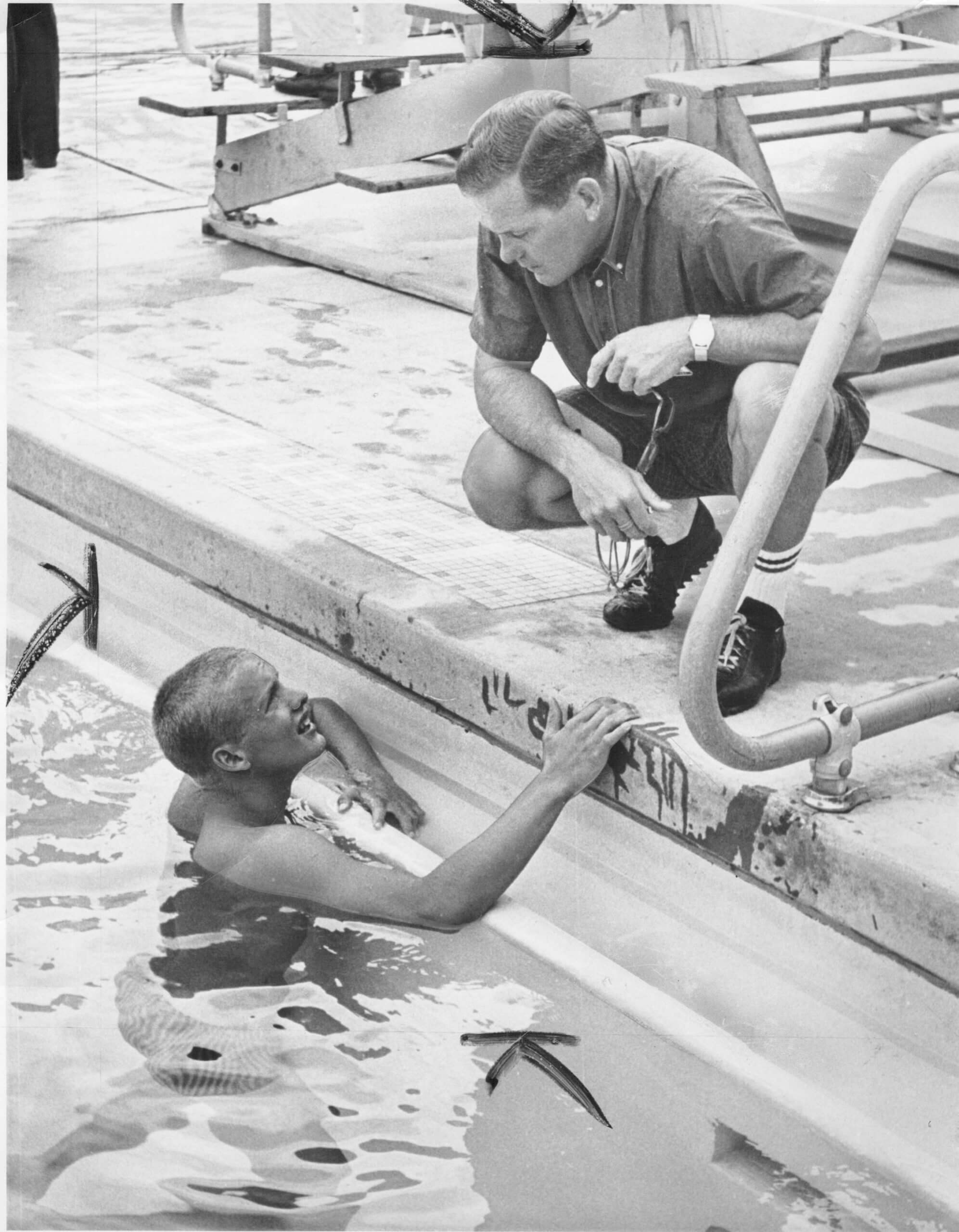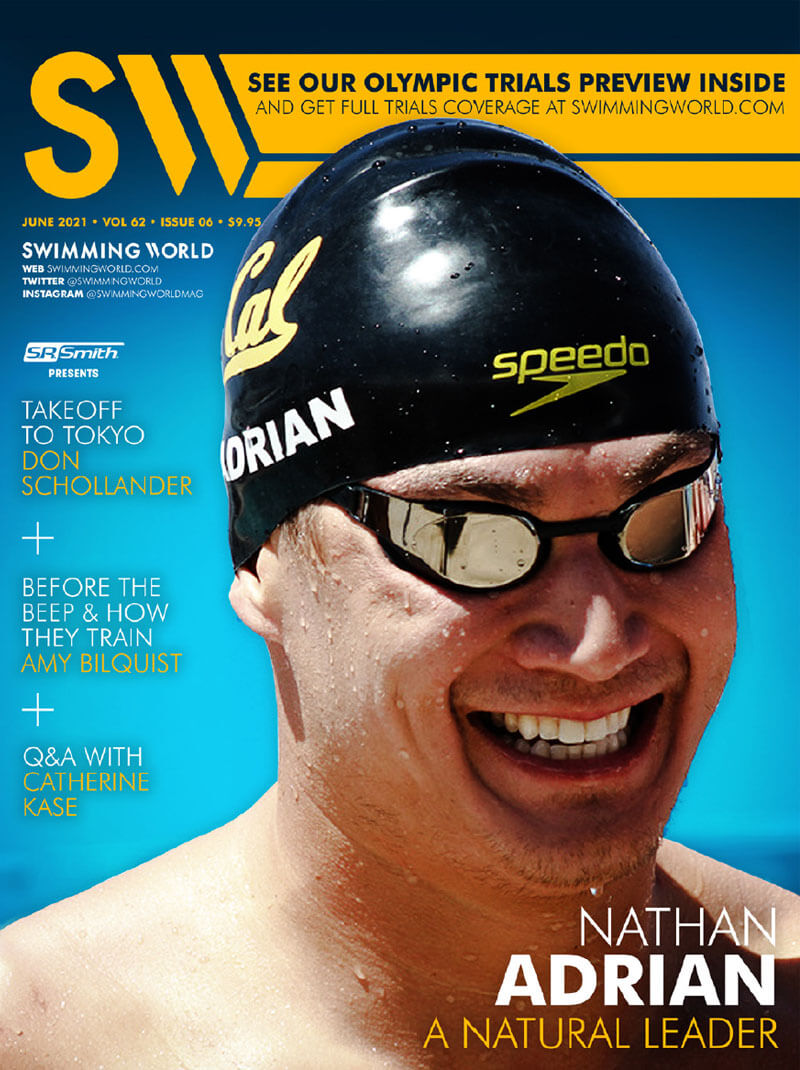Swimming World Presents – Takeoff To Tokyo – Don Schollander: A Forgotten Star – Sponsored By S.R. Smith

The latest issue of Swimming World Magazine
is now available for download in the Swimming World Vault!
Non-Subscribers Can Download This Issue Here
Takeoff To Tokyo – Don Schollander: A Forgotten Star
By John Lohn
By all measures, Don Schollander is a legend in the sport, a Hall of Fame talent who was unrivaled in his heyday. Yet, his impact has been lost to a combination of unfortunate timing and modern-day fascination.
How can a five-time Olympic champion be underappreciated? How can a man who set double-digit individual world records go overlooked? How can the one-time face of Team USA find himself snubbed on the scale
of historical greatness?
Don Schollander was dominant. He was versatile. He was clutch in pressure situations. A half-century beyond retirement,
he deserves continued recognition of his greatness. Yet, Schollander is a largely forgotten star.
Among aquatic enthusiasts, there is little debate regarding the greatest American triumvirate among male athletes. Michael Phelps sits at the head of the boardroom table, the CEO of the sport. Meanwhile, vice presidential status is held by Johnny Weissmuller, actually best known for his cinematic identity as Tarzan, and Mark Spitz, he of seven gold medals and seven world records at the 1972 Olympic Games
in Munich.
Because modernity plays a role in most subjective rankings, the next name typically mentioned is that of Matt Biondi, the highest-profile American star of the 1980s and 1990s.
What about Schollander?
While he was widely appreciated in his era, his greatness was quickly dismissed, the aura of Spitz casting an inescapable shadow. Timing simply was not on Schollander’s side. His excellence was delivered prior to the period in which professionalism was an option, with endorsement deals available to the top-tier athletes in the sport. More, Schollander was the victim of Spitz’s surging star and monumental performance at the Munich Games.
Really, the lack of appreciation for Schollander is an injustice.
A STELLAR CAREER
There are several ways to place the career of Don Schollander in perspective. The task could be handled by focusing on his Olympic exploits. Or, we could dissect the power of his world-record performances. Instead, let’s go with this bullet point on the man’s résumé: Schollander was a member of the inaugural induction class into the International Swimming Hall of Fame.
When the Hall of Fame announced its initial entrants in 1965, Schollander was just a year removed from starring at the 1964 Olympics in Tokyo. He was also a mere 19 years old, with several more impressive years ahead of him. Yes, Schollander earned Hall of Fame status as a teenager and in the prime of his career.
Schollander’s precocious talent was on display in his early teens, as he guided Lake Oswego High School to the Oregon state championship as a freshman. Meanwhile, by the time he was 16, he was a multi-time national champion and on pace to become a headliner for the United States. That identity was etched at the 1964 Olympics.
Having qualified for the Tokyo Games in the 100 freestyle and 400 freestyle, Schollander embraced a four-event schedule. In relay action, Schollander fueled the United States to world records in the 400 freestyle relay and 800 freestyle relay, with Germany the runner-up in both events. His individual success required a bit more work, but was just as golden.
In the 100 free, Schollander (53.4) eked out a narrow triumph over Great Britain’s Bobby McGregor (53.5). A couple of days later, he went back to work in the 400, this time prevailing with a world record of 4:12.2, nearly three seconds ahead of the silver-medal time of Germany’s Frank Wiegand (4:14.9).
The critical nature of the 100 freestyle was not lost on Schollander, as that event jumpstarted his success and supplied much-needed momentum: “Because it was my first event, I felt that this race could make me or break me for the rest of the Games,” he said. “If I won, I would be up for the rest of my events—my confidence would be flying high. If I lost, I would be down. That sounds temperamental, but I have seen an early race work this way on swimmers. So this 100 free took on much more importance than just another event.”
With four gold medals to his credit, Schollander became an Olympic hero, with his title count matching what the legendary track athlete, Jesse Owens, managed at the 1936 Olympics in Berlin. The total could have been higher, too, if not for the U.S. coaching staff’s decision not to use Schollander on the 400 medley relay.
As the Olympic champion in the 100 free, Schollander figured to have earned the anchor slot on the medley relay. Instead, the coaches went with Steve Clark, who was the fastest American in the 400 freestyle relay. The decision was highly questionable.
“Certainly, in the back of my mind, I was aware that this could mean my fifth gold medal,” Schollander said of being on the medley relay. “And it wouldn’t be just one more gold medal—it would be an unprecedented fifth gold medal. No swimmer had ever won four gold medals at an Olympics, but nobody in history—in any sport—had ever won five. But this wasn’t my arguing point. I felt that I had earned the spot on the medley relay team.”
In the ensuing years, Schollander added to his greatness, winning the 200 freestyle at the 1967 Pan American Games and adding Olympic gold in the 800 freestyle relay at the 1968 Games in Mexico City.

Schollander, only 18, matched what legendary track athlete, Jesse Owens, managed at the 1936 Olympics in Berlin: four gold medals. (Pictured, from left: 1964 men’s Olympic 400 freestyle medalists: Frank Wiegand, United Team of Germany, silver; Schollander, gold; and Allan Wood, Australia, bronze.)
WHAT COULD HAVE BEEN
The schedules utilized for today’s major championship competitions provide a little something for everyone. At the World Championships, sprint specialists are offered 50-meter events in each stroke. And at this summer’s Olympic Games in Tokyo, the 800 freestyle will be offered for men for the first time, with the 1500 freestyle new to the women’s program.
During Schollander’s era, the Olympic program was limited, and the World Championships were still a figment of the imagination.
Specifically, Schollander was denied the chance to contest the 200 freestyle—his best event—when the American was at his peak at the 1964 Olympics.
Although he possessed the speed necessary to excel in the 100 freestyle and the endurance required of the 400 freestyle, Schollander was at his best in the 200 freestyle. It was his sweet spot, and no foe had the ability to keep pace.
A statistical look at the event serves as proof of Schollander’s dominance: From 1962 to 1968, Schollander set 11 world records in the 200 free, including seven consecutive marks from 1964 to 1968. Over the course of those records, Schollander took the time in the event from 2:00.4 to 1:54.3, a massive leap that speaks to the revolutionary nature of Schollander’s skill.
“There are three things that make Don such a terrific swimmer,” said George Haines, who molded Schollander into a champion at the Santa Clara Swim Club. “First, he is almost flawless mechanically. Second, he has a tremendous desire to win. Finally, he is a thoroughly intelligent competitor with a wonderful tactical sense.”
As successful as Schollander was at the 1964 Olympics, his haul almost surely would have been five gold medals had the 200 freestyle been part of the program (and even possibly six had he been selected to swim the medley relay). But the four-lap discipline was not added to the schedule until 1968, and while Schollander was still superb at that point in his career, he was not the untouchable force who went to Tokyo and emerged as the sport’s main man.
At the Mexico City Games, Schollander claimed the silver medal in the 200 freestyle, beaten to the wall by Australian great Michael Wenden. It was a surprise setback, but one that Schollander took in stride and did not lament. Rather, he was able to view his career through a lens that focused on all that was accomplished, not what was lost.
“I feel very fortunate to have gained the success I’ve achieved,” he said. “I think it’s a career I’ll be able to look back on and be very pleased about. I would have liked to have won because it is my last race, but I did as fine a job as I could. I’m not disappointed a bit.”

“There are three things that make Don such a terrific swimmer,” said George Haines, who molded Schollander into a champion at the Santa Clara Swim Club. “First, he is almost flawless mechanically. Second, he has a tremendous desire to win. Finally, he is a thoroughly intelligent competitor with a wonderful tactical sense.”
A CEREBRAL APPROACH
One of the main struggles for swimmers who reach the pinnacle of their sport is finding an alternate identity. Athletes in the sport, including today, have a difficult time transitioning to life after swimming, or finding interests to offset the zoned-in nature of training. Schollander, though, was different.
After his Olympic success, Schollander enrolled at Yale University and continued to excel in the water. But as an introspective individual, he found a balance in his life and made sure he was well-rounded in his endeavors.
“This is the crux. Before you decide how you want to live your life, you must look at yourself and attempt to know yourself,” Schollander once said. “I look at myself as a person who’s trying to develop as an individual. It’s been important to me throughout my life to be much more than a student, to be much more than an athlete, to be much more than anything. This is consistent with my philosophy of the well-rounded, but not necessarily Renaissance, man. I’m proficient in the academic side, the athletic side and the social side. I’m not proficient in the arts—music, painting, sculpture. Unfortunately, I don’t have time to go to more plays, take in concerts. I’m always on the go. I think I have a very active mind. I don’t feel I do total justice to anything.”
Another element of Schollander’s career that defined his success was the mental game he played. Schollander walked with an air of confidence about him, and never appeared rattled. He played a psychological game with the opposition, his lack of nerves—well—unnerving.
Obviously, Schollander did justice to his career in the pool. Sure, the likes of Phelps, Spitz and Weissmuller might receive greater attention, but anyone with deep knowledge of the sport will recognize Don Schollander as a legend. He was a thoroughbred in the water, as once noted by his college coach, Phil Moriarty.
“His stroke is flawless,” Moriarty said. “Every other swimmer I’ve worked with had a flaw. With legs only, he does as well as anyone, and he has combined this so well with his stroke that he is a one-motored man. Many swimmers are two-motored, in that they don’t synchronize their stroke and kick.
“As a coach, all I can do is observe him and tell him when he’s going off pattern, keep him busy, give him a program. With Don Schollander, I feel like I’m training a racehorse. How can I communicate with a horse?”
By letting him run, or in Schollander’s case, swim. And he performed his craft better than most.
Click here to download the full June 2021 Issue of Swimming World, available now!
Get Swimming World Magazine and Swimming World Biweekly FREE When You
Become A Member of the International Swimming Hall of Fame
New! 30 Day Membership to ISHOF AND Digital Swimming World Subscription for just $10 a month!
Want more? Get a 1 Year ISHOF Family Membership With Swimming World Print AND Digital Subscription Order Now!
Non-Subscribers can click here to download this issue for only $5.94
Swimming World June 2021 Issue
FEATURES
12 | U.S. OLYMPIC TRIALS PREVIEW
by David Rieder
The fastest swimmers in the United States will be putting their hopes and dreams on the line at the U.S. Olympic Team Trials-Swimming, June 13-20, in Omaha, Neb. If realized, they’ll have the opportunity to perform next month on the world’s grandest stage: the Olympic Games in Tokyo.
22 | A NATURAL LEADER
by John Lohn
Still producing elite-level performances, Nathan Adrian, now 32 and pursuing his fourth Olympic Games, has the opportunity to further his already lofty reputation. And whenever his days in the sport come to an end, Adrian will be viewed for his excellence in the sport as an athlete, teammate and ambassador.
25 | NJCAA CHAMPIONSHIPS: QUALITY & QUANTITY
by Andy Ross
That’s the same winning formula that Indian River’s men’s and women’s swimming and diving teams have been using for nearly a half-century at the NJCAA Championships. The Pioneer men now have won 47 straight team titles; the women, 39—and 43 of the past 47.
26 | TAKEOFF TO TOKYO: A FORGOTTEN STAR
by John Lohn
By all measures, Don Schollander is a legend in the sport, a Hall of Fame talent who was unrivaled in his heyday. Yet, his impact has been lost to a combination of unfortunate timing and modern-day fascination.
29 | DOMINANCE AND PARITY ON DISPLAY IN TOKYO
by Dan D’Addona
While the U.S. women have dominated international water polo since 2015—winning their second straight Olympics in 2016 plus three World Championships in 2015-17-19—a different men’s champion has emerged at each of the last three major international competitions—Serbia (2016 Olympics), Croatia (2017 Worlds) and Italy (2019 Worlds).
30 | ISHOF: REMEMBERING THE KALILI BROTHERS—90 YEARS AGO
by Bruce Wigo
As kids who preferred to dive for coins rather than race in a swimming pool, brothers Maiola and Manuella Kalili from Hawaii would eventually become national champions and Olympic silver medalists in 1932.
33 | NUTRITION: HOW MANY CALORIES SHOULD I EAT?
by Dawn Weatherwax
As long course, Olympics and endurance events get underway, a common question is: “How much do I need to eat?” This is a loaded question—one in which the author will try to simplify.
35 | MENTAL PREP: BEFORE THE BEEP WITH AMY BILQUIST
by Shoshanna Rutemiller
COACHING
38 | SWIMMING TECHNIQUE CONCEPTS: MAXIMIZING SWIMMING VELOCITY (Part 2)—STROKE CYCLE PHASES
by Rod Havriluk
Swimmers typically decrease non-propulsive time to decrease stroke time, increase stroke rate and swim faster. Research shows that a further decrease in the non-propulsive time is possible and should produce further performance improvement.
40 | A COACHES’ GUIDE TO ENERGY SYSTEMS
by Michael J. Stott
In the first of two parts, Swimming World explores the concept of energy systems and how coaches can use them to maximize athlete development and performance.
42 | SPECIAL SETS: KATIE LEDECKY—RUN-UP TO RIO 2016
by Michael J. Stott
With this month’s Olympic Swimming Trials now upon us, Swimming World takes a back-to-the-future approach to revisit some training done by superstar Katie Ledecky prior to the 2016 U.S. team qualifying meet.
44 | Q&A WITH COACH CATHERINE KASE
by Michael J. Stott
45 | HOW THEY TRAIN HALEY ANDERSON
by Michael J. Stott
TRAINING
037 | DRYSIDE TRAINING: TRAINING AMY BILQUIST
by J.R. Rosania
JUNIOR SWIMMER
47 | UP & COMERS: KEELAN COTTER
by Shoshanna Rutemiller
COLUMNS
08 | A VOICE FOR THE SPORT
11 | DID YOU KNOW: ABOUT BUSTER CRABBE?
48 | GUTTERTALK
49 | PARTING SHOT
Swimming World is now partnered with the International Swimming Hall of Fame. To find out more, visit us at ishof.org





